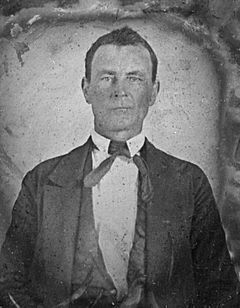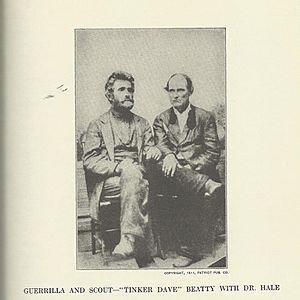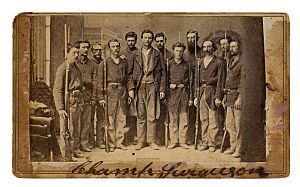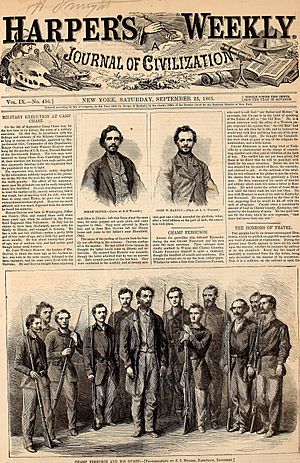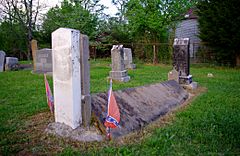Champ Ferguson facts for kids
Quick facts for kids
Samuel Ferguson
|
|
|---|---|
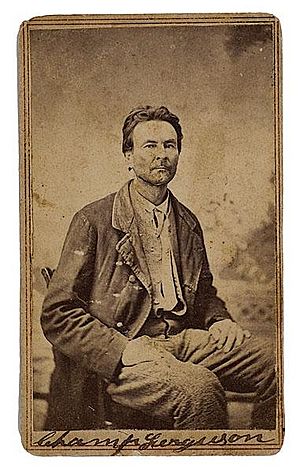
Champ Ferguson in 1865
|
|
| Born | November 29, 1821 Clinton County, Kentucky, U.S.
|
| Died | October 20, 1865 (aged 43) Nashville, Tennessee, U.S.
|
| Cause of death | Execution by hanging |
| Resting place | France Cemetery White County, Tennessee |
| Criminal status | Executed |
| Conviction(s) | War crimes |
| Criminal penalty | Death |
Samuel "Champ" Ferguson (born November 29, 1821 – died October 20, 1865) was a well-known fighter for the Confederacy during the American Civil War. He was a "guerrilla," meaning he fought in small, unofficial groups rather than as part of a regular army. After the war ended, the United States government arrested him. He was put on trial and found guilty of breaking the rules of war. He was then executed.
Champ Ferguson's Early Life
Ferguson was born in Clinton County, Kentucky, in a part of Kentucky that borders Tennessee. He was the oldest of ten children in his family. This area was known as the Kentucky Highlands. Most families there were farmers who owned few or no enslaved people.
Like his father, Champ Ferguson became a farmer. Even before the American Civil War began, he was known for getting into fights. In 1858, he was involved in a serious argument with two brothers, Floyd and Alexander Evans. During this argument, their cousin, James Reed, who was a local officer, was killed. Floyd Evans was also badly hurt. Ferguson later moved with his wife and family to the Calfkiller River Valley in White County, Tennessee.
Fighting During the Civil War
During the Civil War, the eastern part of Tennessee was mostly mountains. Many people there did not want to leave the Union. For example, a place called the "Free and Independent State of Scott" was formed to show this. Other parts of Tennessee, especially in the west, had more slave owners and supported the Confederacy.
Because of these differences, East Tennessee became a place where many small fights happened. These battles were often far from the main battlefields. Confederate soldiers fought against local groups who supported the Union. Starting in 1862, Union troops took control of Tennessee. This made the tensions and divisions even worse.
The mountains and the lack of police during the war meant that guerrillas and other unofficial military groups could act freely. Many stories were told about revenge attacks, especially in the Cumberland Plateau area. Families were often divided by the war. One of Champ Ferguson's brothers fought for the Union army and was killed in battle.
Early in the war, Ferguson put together his own group of guerrilla fighters. He began attacking anyone he believed supported the Union. Many old arguments between neighbors turned into violent acts during the war. Ferguson's men sometimes worked with Confederate army units. These units were led by generals like John Hunt Morgan and Joseph Wheeler. There is some evidence that General Morgan made Ferguson a captain of "partisan rangers." However, Ferguson's men often did not follow military rules and sometimes broke the normal rules of war.
His Trial and Execution
When the Civil War ended, Ferguson sent his men home and went back to his farm. As soon as Union troops found out he was back, they arrested him. He was taken to Nashville, Tennessee, where he faced a military trial. Ferguson's trial became very famous across the country and was a big news event. During the trial, Ferguson argued that his actions were simply part of his duty as a soldier.
On October 10, 1865, Ferguson was found guilty of war crimes. He was sentenced to death.
He was executed on October 20, 1865. Champ Ferguson was one of only two men who were tried, found guilty, and executed for war crimes during the Civil War. The other was Captain Henry Wirz, who was in charge of the famous Andersonville prison in Georgia. Ferguson was buried in the France Cemetery, which is north of Sparta, Tennessee, in White County. This cemetery is now next to Highway 84.
 | Janet Taylor Pickett |
 | Synthia Saint James |
 | Howardena Pindell |
 | Faith Ringgold |


